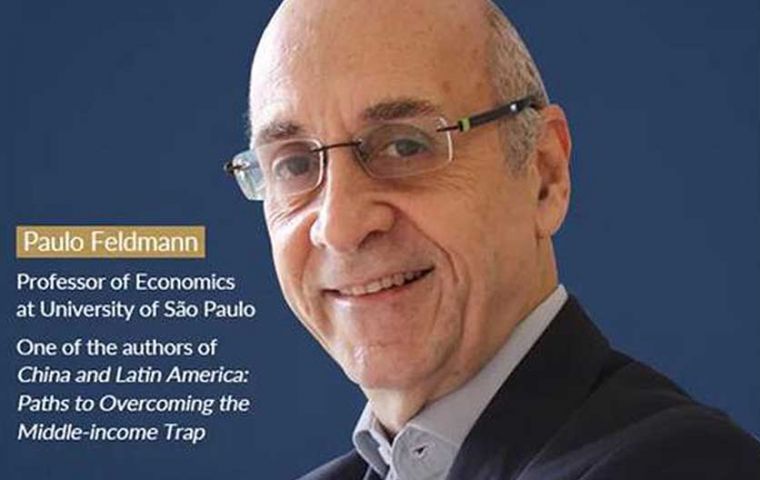MercoPress. South Atlantic News Agency
“Brazil needs long term planning in industry and technology”, if it is to upgrade foreign trade quality
 Feldmann, “We are not a country that plans for the future; industrial policy cannot have a short-term horizon. We need to follow Asian countries implementing 20-year plans.”
Feldmann, “We are not a country that plans for the future; industrial policy cannot have a short-term horizon. We need to follow Asian countries implementing 20-year plans.”  Alckmin, “Yes, diversification is already underway, but there is still significant room for progress, especially in higher value-added products”
Alckmin, “Yes, diversification is already underway, but there is still significant room for progress, especially in higher value-added products” Alarm bells are again ringing in Brazil, The country might have impressive foreign trade figures and surpluses, but Brazil has been unable to gain competitive advantages in sectors beyond agriculture and mining. “Exports remain heavily concentrated in commodities such as soybeans, oil, and iron ore,” and the country has been unable “to upgrade the quality of this trade relationship, especially by exporting more industrial products.”
Comments belong to Paulo Feldmann, professor at the University of Sao Paulo School of Economics, Business Administration and Accounting, one of the leading academic centres of the country and which also hostas a think-tank on development and commercial opportunities.
In an interview with Valor, a financial media, Mr. Feldmann adds that at this rate “We’ll keep exporting the same products Brazil is known for, and they are far from ideal”. The problem and main challenge is the lack of public policy planning. “We are not a country that plans for the future; industrial policy cannot have a short-term horizon. We need to follow the example of Asian countries implementing 20-year plans.”
Feldmann believes it’s a matter of better leveraging synergies and opportunities. “China wants to lead the Global South, a region that offers incredible biodiversity vital for the pharmaceutical and agricultural industries. The active ingredients in medications are increasingly sourced from tropical forest biodiversity. What is Brazil doing in this area? It could be a major pharmaceutical producer. But these things don’t just fall from the sky,” he criticizes.
The economist also points to the poor education system and a severe shortage of skilled labor. “You can’t make progress in biotechnology if you don’t have highly trained human resources.”
Other experts poin out that Brazil struggles to compete in exporting manufactured goods to China, but it faces competition from Asian countries that benefit from heavy Chinese investment in their supply chains, like Vietnam. Industry representatives also complain that Brazilian products still face entry barriers in the Chinese market.
A report by Brazil’s the National Confederation of Industry (CNI) released last year indicated that China is the main market, after Europe, imposing barriers to Brazilian exports. This underscores the importance of commercial and diplomatic efforts, such as Brazilian government recent initiatives.
Still, CNI point out that exports linked to agribusiness are evolving, according to analysts. There has been an increase in processed coffee exports, for example. And meat exports—part of the food processing industry—have also grown (a 48% increase in four years, from US$ billion in 2020 to US$ 5.9 billion in 2024). It’s a respectable rise, even if it doesn’t match the oil export boom, which surged nearly 76% in the same period, reaching almost US$ 20 billion last year. “But again they are commodities, with little input of intelligence”.
Feldmann believes renewable energy is another area where Brazil could stand out. “Brazil is one of the world’s top producers of electricity from renewable sources.” Brazil should focus on producing equipment and products for the sector, including green hydrogen. “The challenge is transporting green hydrogen, but this will be solved in the next few years. In five to ten years, it could be transported. Until then, it can be produced and used domestically.”
However Geraldo Alckmin, Vice President of Brazil and head of the Ministry of Development, Industry, Trade, and Services (MDIC), is more optimistic and admits shortcomings, “but we are working on them.”
“Yes, diversification is already underway, but there is still significant room for progress, especially in higher value-added products. A clear example is agribusiness chain products, which are already highly competitive and technologically complex, such as food and beverages with growing market share for Brazilian brands, products from the health industrial complex, and other industrial goods,” argues Alckmin.
The minister notes that the share of durable and non-durable consumer goods in exports to China rose from less than 3% in 1997 to around 8% in 2024. He also highlights the growing number of Brazilian companies exporting to China. Over the past 16 years, there has been an average annual increase of 5%, he says. Among micro and small enterprises, the growth reached 15% per year since 2014.
Alckmin points out to the industrial revitalization policy launched by his ministry, the New Industry of Brazil (NIB). “With it, the sector will strengthen its production chains, achieving greater technological competitiveness and deeper international integration,” and mentions areas such as aviation, defense, renewable energy, and biofuels as having strong export potential and opportunities for sustainability-driven partnerships.
But Ricardo Cappelli, president of the Brazilian Industrial Development Agency, ABDI indicates that “improving the quality of our export mix depends much more on Brazil than on China.” He emphasizes that investment in technology and innovation is essential. “That’s our challenge, because China’s investments in these areas are astronomical. It’s a global challenge, not just Brazil’s.”
Cappelli adds that Brazil has the cleanest energy matrix among G20 countries, opening up competitive advantages. “But hydrogen must not become just another Brazilian commodity, “he warns. “Our challenge is to use this strategic energy advantage to attract industrial plants to Brazil.”




Top Comments
Disclaimer & comment rulesCommenting for this story is now closed.
If you have a Facebook account, become a fan and comment on our Facebook Page!